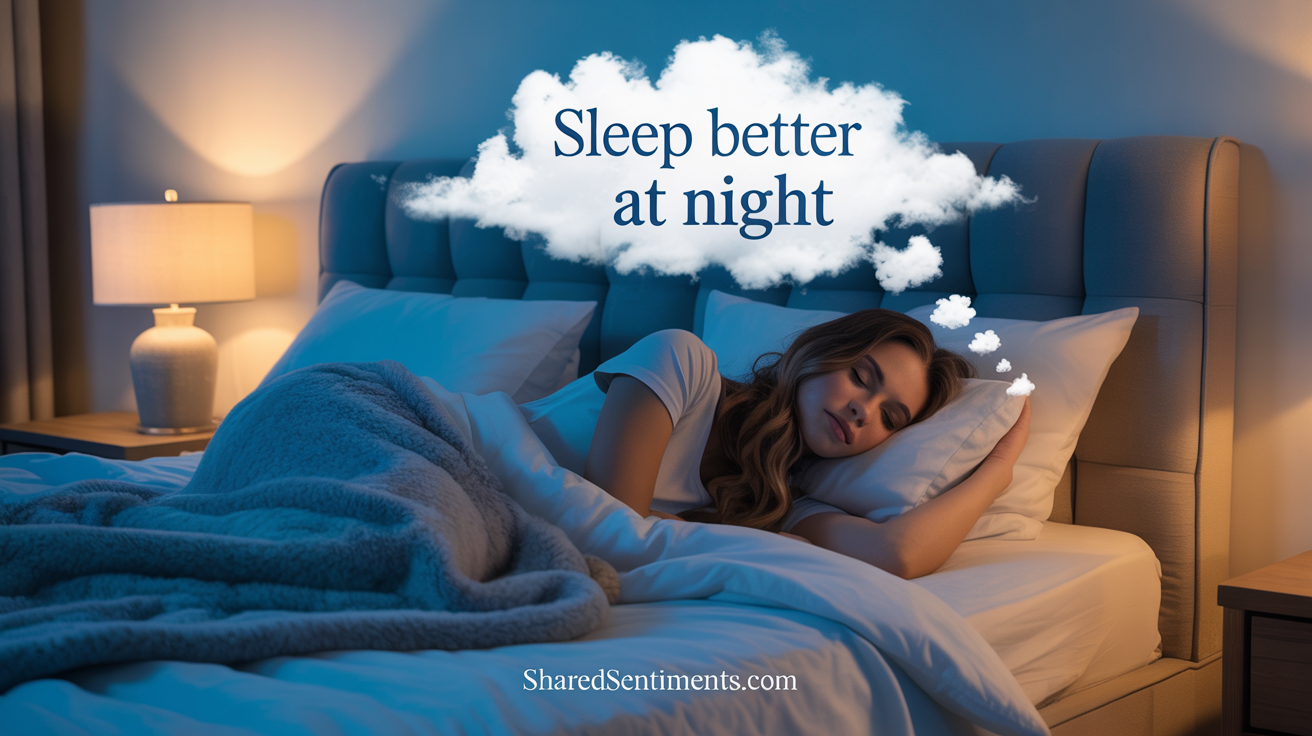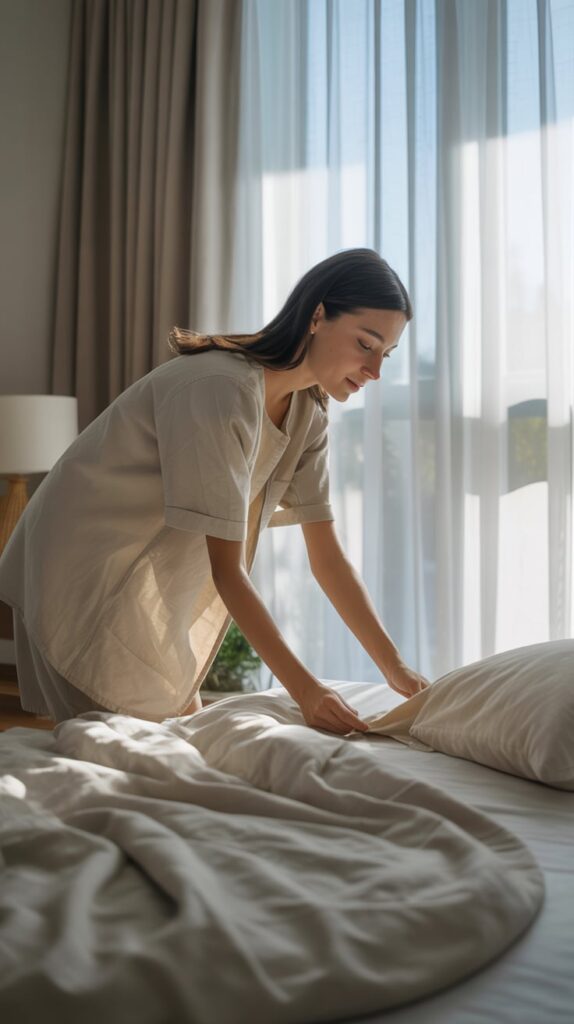How To Sleep Better At Night – 13 Good Things To Do During Bedtime

Is it even possible?
Or is this just another post that tells you to eat right, close your eyes, and breathe deeply until you drift off?
Well—yes and no.
Some of those tips matter, and I’ll mention a few.
But what I really want to share with you are simple things that actually helped me improve my sleep.
Because when your sleep is off, everything else feels harder.
Your body needs quality rest to work right.
You think clearer when you’re rested.
You feel calmer.
You handle stress better.
And honestly, you just feel more like yourself.
Good sleep makes a huge difference in your overall health.
Why Sleeping Better At Night Is So Important
Here’s what I noticed once I started sleeping better at night:
- My mind felt calmer and less anxious
- My heart health improved
- I stopped gaining extra weight
- I could think more clearly
- I had more energy during the day
- I could focus for longer
- I got more done
- I got sick less often
- And overall, I just felt healthier
When I say “sleep better,” I don’t just mean getting 7–9 hours (even though that’s what most adults need).
Because the truth is, you can sleep for eight hours and still wake up tired.
I’ve had nights like that.
I’d sleep the right amount, but still feel groggy in the morning.
Why?
Because I was tossing, turning, and waking up without knowing it.
That’s what poor-quality sleep looks like.
And that’s where better sleep habits come in.
Small changes in your bedtime routine can lead to real rest—not just time spent in bed.
How To Sleep Better At Night (13 Perfect Ways)
1. I stopped using my phone before bed
This one hurt the most.
I used to scroll every night until I couldn’t keep my eyes open.
But that blue light? It was ruining my sleep.
I started setting my phone aside 30–60 minutes before bed.
No social media. No news. No late-night texts.
Just a break from screens.
That alone helped my brain slow down and get ready to sleep.
2. I kept my bedroom cool
I didn’t realize how much temperature affected my sleep until I lowered the thermostat.
I started sleeping better when the room was cooler.
Now I keep it around 65–68°F.
It makes the bed feel cozier, and I fall asleep faster.
When it’s too warm, I toss and turn.
A cooler room makes a big difference.
3. I went to bed at the same time every night
Even on weekends.
At first, it felt like I was back in school with a set bedtime.
But once my body got into a routine, falling asleep became easier.
I started waking up naturally—without alarms.
And I felt way more rested.
Sticking to a sleep schedule helped train my body to sleep when it’s supposed to.
4. I stopped drinking caffeine in the afternoon
I love coffee.
But I learned the hard way that afternoon caffeine messes with my sleep.
Even if I didn’t feel wired, my body wouldn’t fully relax at night.
Now I cut off coffee around 1 or 2 p.m.
If I want something warm later, I go for decaf or herbal tea.
That helped me sleep deeper.
5. I made my room darker
Streetlights. Alarm clocks. Phone screens.
All those little lights added up.
So I bought blackout curtains and covered the bright clock.
I also stopped falling asleep with the TV on.
Total darkness helped signal to my brain that it was time to sleep.
It’s a small change, but it helped me stay asleep longer.
6. I paid attention to what I ate at night
Big, heavy meals late at night made me feel bloated and restless.
Spicy food kept me up.
So I started eating dinner a little earlier—at least 2–3 hours before bed.
If I needed a snack later, I’d go for something light, like yogurt or a banana.
Nothing fancy.
Just something easy to digest.
7. I created a simple bedtime routine
Nothing complicated.
I wash my face, brush my teeth, maybe read a few pages of a book.
Sometimes I stretch or do deep breathing for five minutes.
The point is to send a message to my brain: “Hey, it’s bedtime.”
Doing the same few things every night helped me wind down.
And now my body knows it’s time to rest.
8. I stopped checking the time during the night
I used to wake up, look at the clock, and do the math.
“How many hours do I have left to sleep?”
That made me anxious and kept me up longer.
So I stopped.
Now I don’t check the time at all when I wake up at night.
I just keep my eyes closed and try to relax.
Most times, I fall back asleep much faster.
9. I used white noise
This one surprised me.
I didn’t think I needed background noise to sleep.
But I gave white noise a try—and it worked.
It helped block out sudden sounds like cars or dogs barking.
I use a fan now or a white noise app.
It gives my brain something neutral to focus on.
And it keeps the room calm.
10. I limited naps
I love a good nap.
But when I napped too long or too late in the day, I struggled to fall asleep at night.
Now, if I nap, I keep it under 30 minutes and only in the early afternoon.
That quick recharge doesn’t mess with my night sleep.
It’s enough to feel refreshed, not groggy.
11. I moved more during the day
Even without a full workout, just getting up and walking more helped.
On days I stayed active, I slept better.
My body felt tired in a good way, and falling asleep felt natural.
So now I make a point to move—walk around the block, stretch, clean the house.
It all adds up.
12. I kept my bed for sleep only
No eating in bed. No working in bed. No watching shows for hours.
Once I started using my bed only for sleep, it helped my brain associate it with rest.
Now when I get into bed, my body knows it’s time to power down.
It’s a simple mental trick that really works.
13. I gave myself grace on the bad nights
Some nights I still sleep poorly.
Maybe I’m stressed. Maybe I ate too late. Maybe it’s just one of those nights.
But I stopped beating myself up for it.
Instead, I just do my best to rest, even if I can’t sleep.
The more I relax, the sooner I fall back asleep.
Stress only makes sleep worse, so I try to stay kind to myself.
Final Thoughts
If you’re trying to sleep better at night, it doesn’t mean you need to change everything at once.
Start with one or two things that feel doable.
Then build from there.
Better sleep isn’t just about more hours in bed.
It’s about getting quality rest that actually helps your body and mind.
These tips helped me sleep better, feel better, and show up better in my life.
You deserve that too.
Sweet dreams.










